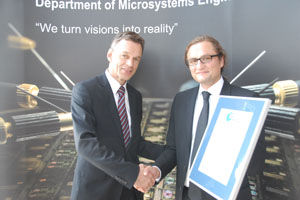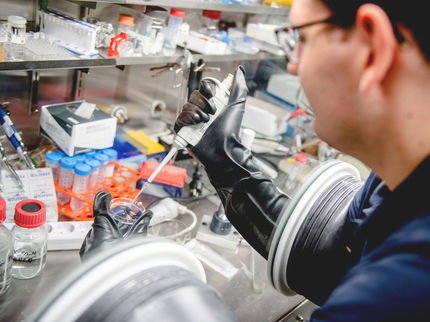Electricity from Blood Sugar
Forum for Applied Microsystems Technology Awards 2011 FAM Research Prize to Dr. Sven Kerzenmacher
implants that obtain their energy from blood sugar and oxygen: Dr. Sven Kerzenmacher at the Department of Microsystems Engineering (IMTEK) of the University of Freiburg is researching the development of biological fuel cells with the goal of finding an inexhaustible source of power in the human body. He has been awarded the 2011 FAM Research Prize for his dissertation by the Forum for Applied Microsystems Technology (FAM). The prize is worth 2,500 euros.
Researchers have yet to find an optimal method for supplying implantable medical microsystems with electrical energy. The batteries of a pacemaker, for instance, need to be replaced after roughly eight years - meaning a strenuous and expensive surgical intervention for the patient. An alternative approach is to use rechargeable batteries. However, the necessity of recharging the batteries greatly reduces the patient’s quality of life. The idea behind Sven Kerzenmacher’s research, on the other hand, is the possibility of using of implantable glucose fuel cells on the basis of noble metal catalysts like platinum. Such catalysts are particularly well suited for use in implant systems due to their long-term stability and the fact that they can be sterilized. In the future, systems equipped with these fuel cells could be supplied with power by way of a continuous electrochemical reaction between glucose and oxygen from the tissue fluid.

Wolfgang Bay and Dr. Sven Kerzenmacher (from left)
Dr. Sven Kerzenmacher
Kerzenmacher and his team aim to apply a thin coat of the fuel cells they have developed to the surface of the implant. The advantages of this technique over existing technologies stem from the fact that the fuel cells are only half as thick while delivering a 30 percent increase in performance. Moreover, platinum electrodes are not sensitive to unwanted chemical reactions like hydrolysis and oxidation. Kerzenmacher and his research group consisting of biologists, chemists, and engineers are currently developing new materials and techniques to improve the performance of the fuel cells.
The prize was presented at the IMTEK Research Day on 14 July 2011 by FAM Chairman Wolfgang Bay from the sensor manufacturer SICK AG, Waldkirch. FAM supports practical training for engineering students at the University of Freiburg and promotes exchange between IMTEK and the industrial sector, the government, and society. It consists of six board members from private companies and the university as well as numerous member companies. Each year the association awards the prize for outstanding scientific achievements, developments, and innovations in microsystems technology.
Organizations
Other news from the department science

Get the analytics and lab tech industry in your inbox
By submitting this form you agree that LUMITOS AG will send you the newsletter(s) selected above by email. Your data will not be passed on to third parties. Your data will be stored and processed in accordance with our data protection regulations. LUMITOS may contact you by email for the purpose of advertising or market and opinion surveys. You can revoke your consent at any time without giving reasons to LUMITOS AG, Ernst-Augustin-Str. 2, 12489 Berlin, Germany or by e-mail at revoke@lumitos.com with effect for the future. In addition, each email contains a link to unsubscribe from the corresponding newsletter.


























































